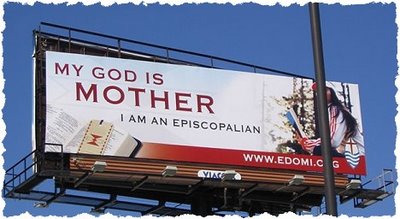 Wow! Now that is a billboard with a message! Questions about the legitimate use of female imagerly for God raises questions about the fact that God language serves the purpose to reveal him as personal, not as a man. Scholars continue to debate whether female images in Scripture are metaphorical or analogical. In my opinion, Donald Bloesch nailed the issue years ago when he said that calling God "mother" undermines the very basis for trinitarian theism. Unfortunately, in the two decades since his book was published, mainline Christianity has learned very little from the gracious ecumenical theologian. This billboard is a case in point.
Wow! Now that is a billboard with a message! Questions about the legitimate use of female imagerly for God raises questions about the fact that God language serves the purpose to reveal him as personal, not as a man. Scholars continue to debate whether female images in Scripture are metaphorical or analogical. In my opinion, Donald Bloesch nailed the issue years ago when he said that calling God "mother" undermines the very basis for trinitarian theism. Unfortunately, in the two decades since his book was published, mainline Christianity has learned very little from the gracious ecumenical theologian. This billboard is a case in point.Bloesch's argument proceeds along two lines. First, inclusive God language tends to substitute functional terms for ontological symbols. The early church called this kind of program by a different name, "modalism" (cf. Creator, Redeemer, Sanctifier). Second, Bloesch contends that such portrayals of God cannot be reconciled with the biblical record or its understanding of God's nature as a transcendent Creator. Somehow, calling God the "Primal Matrix,” or “Womb of Being” (cf. some of the feminist theologians and their creative naming of the Deity) misses the point by a mile.
In his The Battle for the Trinity, Bloesch says God “exists as an absolute being” who is not dependent on the world since he “also coexists as a fellowship within himself” (The Battle for the Trinity: The Debate over Inclusive God-Language; Ann Arbor, MI: Servant, 1985, 31.). As several have observed, if we prefer modern and post-modern "dynamic equivalents" to Father, Son, and Holy Spirit, we will only succeed in dismantling the biblical revelation of God as a Trinity of persons.
To Bloesch's points, I would add another. Attempts to prefer inclusive language for the personhood of God are typically advanced for ideological and evangelistic reasons. Either the speaker seeks to reimage Christianity in inclusive ways for philosophical reasons (e.g., to comport better with modern feminism) and/or they are looking to remove the scandal of "old fashioned" ways of conceptualizing the Deity. Unfortunately, de-personalizing God, either for ideological or evangelistic reasons, exacts too high a price. Whatever may be gained in good will with feminists or non-Christians hardly equals the losses to a biblical view of God as a person.
He is, after all, our Father, Son, and Holy Spirit.
Ironically, the campaign was designed by Uproar Communications on behalf of the Episcopal Diocese of Michigan. Indeed, they are so delighted with the work, they are even offering other Episcopal Dioceses an opportunity to use the campaign material. It "only" costs $5,532.50! For this round number, you obtain usage rights a web portal, print advertisements (including bus and billboard), and radio and TV scripts. And, the logo, "of course, will be customized on all the material to match yours." (http://episcopal.uproarcom.com/)
Do you think that our re-branding public relations firm in the ABC has heard of Uproar Communications?

No comments:
Post a Comment